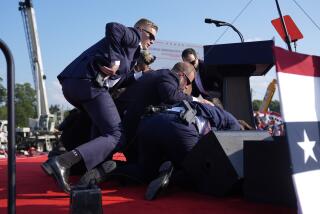Security Tighter at U.S. Moscow Embassy
- Share via
MOSCOW — More than four months after the so-called spy dust incident, the U.S. Embassy here is taking noticeably stricter security precautions.
A metal detector has been installed at the entrance to the embassy, on Garden Ring Road, and Americans have started to replace some of the estimated 200 Soviet citizens who work in or around the building.
Last Aug. 21, the American community was advised that the KGB, the Soviet security police, had been exposing some Americans to a tracing powder and that it might be dangerous, even possibly cancer-causing.
The incident caused a flurry of concern, especially among parents of young children, but the concern seems to have vanished along with the summer’s breezes.
No Report Issued
A team of American inspectors was brought in to check doorknobs, light switches and car door handles in hopes of finding traces of the chemical, known as nitrophenylpentadiene. A report was expected within 90 days, but none has been forthcoming.
“I have forgotten all about it,” the wife of an embassy military attache said recently. “The inspection team visited us and took samples of the lint from our clothes dryer but we have heard nothing since then.”
Another embassy source said the department believes that the spy dust had been used by the KGB but that it was deposited in such small amounts that it could not be detected even by the most intensive search.
Guards Demand IDs
The concern caused by the powder may have disappeared but the embassy has nevertheless become much more strict about security. Marine guards demand identification of anyone they do not know, and Soviet employees are required to wear identification badges at all times on embassy grounds.
Gradually, Soviet employees are being replaced by Americans and, in time, about half of the Soviet work force of 200 will lose their jobs. They are for the most part drivers and laborers, though some have office jobs.
Congress decided that the Soviet workers represent a potential security threat. For one thing, drivers for top embassy officials are presumed to report to Soviet authorities on anything they see or overhear.
Still, Ambassador Arthur A. Hartman is known to feel that Soviet employees can be helpful in a relatively closed society where even unofficial contacts are not easy to develop.
New Phone Operators
Among the first of the new wave of Americans are telephone operators. Some Soviet citizens had complained that the embassy’s old operators demanded to know their names before they would put the call through.
The present embassy complex presents a difficult security problem. It is used not only by the Foreign Service but also by exchange students, journalists, business representatives, some tourists and worshipers attending Sunday church services. A new building is going up, but it is not expected to be ready for occupancy until 1988 at the earliest.
Guards at the entrance try to be helpful, even to total strangers. A man carrying a passport from the African state of Rwanda turned up recently with a stereo set and asked for the repair service. He was told, gently, that the State Department could not help him.
More to Read
Sign up for Essential California
The most important California stories and recommendations in your inbox every morning.
You may occasionally receive promotional content from the Los Angeles Times.










